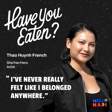Become a Creator today!Start creating today - Share your story with the world!
Start for free
00:00:00
00:00:01

Why Curiosity and Keeping Doors Open Are Needed to Let Love In, Explains Lowhi
Through a series of dynamic and thoughtful conversations between Ji Bowlus (she/her) and guests, we will showcase how wellness intersects with the rich complexities of our diverse Asian diaspora community. We will bring the voices of the Asian diaspora from the peripheral to the center to empower, reclaim agency, and rewrite the narrative of well-being one personal experience at a time.
Transcript
Introduction to the Podcast's Themes
00:00:00
Speaker
nourishing the mind, body, and soul for the Asian diaspora. Have you eaten? Welcome to Have You Eaten, where we aim to highlight the intricate connections between wellness, mental health, and the multifaceted layers of our diverse Asian diaspora community. And by doing so, we seek to empower, reclaim agency, and reshape narratives.
Meet Lohai: Artist and Advocate
00:00:20
Speaker
Today we have Leo, also known as Lohai, joining us. Lohai is an alt-R&B and lo-fi artist and a mental health advocate and leader doing some amazing work in our community. I am so excited to have you here today.
00:00:35
Speaker
Thank you for having me. It's a pleasure. Yeah, yeah. So I mean, just to start, you know, I like to ask, how do you identify? So give us your pronouns and give us your ethnicity, like how you identify.
00:00:52
Speaker
Sure. So yeah, my name's Leo, AKA Lohai. That's my music artist name. Pronouns are he, him, his. And in terms of ethnicity, I'm Chinese, but I'm this kind of a mix between Chinese American and international because I was born here in the States, was here to all six, then between six to 18, actually lived in Beijing. But I've been in LA for almost the past 10 years, 10 years now. Wow.
00:01:19
Speaker
I identify heavily with Californian culture though. I very much embraced being a California guy. Yeah. And we actually met in LA not that long ago. Yes, we did. A few months ago. And I just have to say the reason why I wanted you on the show and wanted to have this conversation with you is your energy is amazing. It's very...
00:01:45
Speaker
There was this very calming, very authentic kind energy that I got from you. We didn't really speak much the first time we met, but I just felt it. And so I knew in the back of my mind, I wanted to have you on as a guest and learn a little bit more about what you were doing. And then when you started talking about the men's group that you lead, and then you performed with Jason,
00:02:14
Speaker
I was like, oh yeah, I don't want to get to know him a little bit better.
Cultural Transition and Identity Challenges
00:02:17
Speaker
I was lucky enough to run into you again in LA, which I was really excited about. That was a fun coincidence as well.
00:02:29
Speaker
Well, first off, I'm curious. So you lived here in the States until you were six years old and then you moved to Beijing. That's right. Which is so interesting to me because I immigrated here when I was three and it doesn't compute in my head like what would that experience be like coming from here to there and yeah, like what was that like?
00:02:56
Speaker
Yeah, I like to call it reverse culture shock, because even though I was born in America, but spent a lot of time in China, obviously, but the school that I went to in Beijing was an international school, much more Western school.
00:03:11
Speaker
Even while I was in China, the way I dressed, the way I talked, I still speak fluent Mandarin, but there's just different things in the Western versus Eastern education. So if I were to go into the city, people could clock pretty quickly. Oh, that's one of them, American-born Chinese people. So in my imagination as a kid, I always thought that I'd come back to America and then everything would be great. Everyone gets along in America. It's this beautiful, perfect melting
00:03:40
Speaker
Part of it is in many in many in many ways and it has issues at the same time i just put america very much on a pedestal when i was there at that time so coming back and wanting very much to be embraced as american.
00:03:56
Speaker
And having those moments where I was like, whoa, I was not raised here. There's certain things like I missed out on cultural experiences or just like different cues. So I like to say that I had to relearn how to be American. I feel pretty good about it now, but it was an adjustment period. Yeah. Well, when you say that when you were in Beijing and people kind of saw that you weren't
00:04:26
Speaker
born there. What were some of those key things? I went back to Korea when I was 11 and I was a chunky kid at 11. I was really chunky and I was really, really dark because I played outside a lot. But I spoke Korean and I remember this little girl saying to another little girl, she must be American. She's fat and dark.
00:04:51
Speaker
Oh my God. And I was like, okay, that's interesting. So what was it? What was it for you? Yeah, I think that's where I learned the difference between like, Hey, I can speak the language just fine, but there's a different, like there's a difference between language and culture, right? Right. Sometimes like language is a transmitter of, of culture, but just because I could speak the language fluently, um,
00:05:19
Speaker
doesn't mean I could understand the experiences of someone that say that went to a local school when they were in elementary school. And you can see the difference,
Finding Belonging in the Asian American Community
00:05:27
Speaker
right? Like I had friends in high school where they went to a local school for elementary and then middle school. And then they came to the international school for high school and I was like, wow, like their Chinese is just obviously so much better. But like just the way they carry themselves, it's just like,
00:05:43
Speaker
more infused with the Chinese culture and tradition. So yeah, you could just feel the difference. And yeah, it was this wild thing of, wow, even though I do speak fluent Chinese, I'm a Chinese person in China, but I still felt a sense of like, oh, you know, not Chinese enough. Whatever that means.
00:06:06
Speaker
Right. And then when you came here, um, like what was, what was the hardest part of kind of getting back into the, the culture of the United States and. Um, just looking for where I exactly belonged.
00:06:26
Speaker
Because I could easily just be like, okay, well, I'm only going to fit in with people that grew up in the exact same way that I did. But, you know, credit to perhaps my outgoingness, you know, I'm able to get along with a wide range of people. And I'll always say, so I went to USC and I'll always credit a lot of people in the Asian American community there for my sense of self that I have today. Because I remember talking to my kind of mentor at the time, his name's Andy Su.
00:06:56
Speaker
I remember asking like, Hey, you know, I didn't grow up in America. I didn't have, you know, the lunchbox moments or like these kinds of shared trauma moments that a lot of Asian Americans identify with, you know, am I allowed here?
00:07:09
Speaker
Am I valuable here? Can I be a part of this? I still want to be a part of this because this is so beautiful to me. I'll never forget him telling me, of course you're a part of this. You don't need to question that. Not only are you a part of this, we welcome you. We welcome your side of the story, of this larger Asian diaspora story.
00:07:29
Speaker
What group are you referring to? Was it a men's group or community group? Yeah. Oh my God. I get to gush about this organization. So it was through the Asian Pacific American Student Services Center at USC. And I'm not sure if they still run it, but it was a program called Circle. And it was basically like an Asian American crash course.
00:07:51
Speaker
It was like an eight week program where we talk about the intersection of different things with Asian American identity, right? Like your sense of identity, gender, sexuality, history, immigration, all these different things. That's where I first learned about Asia, a lot of my Asian American history.
00:08:10
Speaker
And then that culminates in a retreat. So that was a huge part of my college experience. I participated in it. I was a teaching assistant in it. And then my third year I was a director for it as well. Oh, that's amazing. Yeah. So I think because they were so welcoming to me, I got to just dive in and be like, how can I contribute? How can I be of the best service to this community that
00:08:36
Speaker
embraced me in a way that I didn't expect. So extremely grateful, extremely grateful. I love how you brought up the topic of belonging. My college experience was very different from yours. I went to a small liberal arts college, a women's only college in New England. Which one? Which one was it? Mount Holyoke. Okay.
00:09:02
Speaker
Yeah, so it was a fantastic school. But when I was there, it wasn't as diverse as it probably is now today. So I went early for the BIPOC. They didn't call it BIPOC. I think they called it Students of Color Week. And I was the only student of color on my floor in my dorm.
00:09:24
Speaker
And, uh, yeah, it was very eye opening coming from Orange County, you know, kids, so very different experience. So yeah, belonging was definitely, um, at the time the term belonging, uh, wasn't really said out loud, but now that I think about it, it definitely was what I was thinking about. And that reminds me, um, you know,
00:09:52
Speaker
When we, well, I'll get back to that question, but I'm wondering if that group that you were in at USC is what led you to then take on more leadership opportunities and community groups and the men's group that you run.
Leadership and Influence in Men's Groups
00:10:09
Speaker
Yeah, absolutely. It was the foundation, right? That's the humbling part about doing this work. It's really this feeling of like, oh wow, I'm standing on the shoulders of giants, right? So I did for the first time in many years, since before the pandemic, an in-person Asian men's support group.
00:10:31
Speaker
in mid-city LA. And someone that got to attend was this man called Dan Quang. So when I first started doing Asian men's group work, everyone around me was like, you got to meet Dan Quang. You got to meet Dan Quang. Older, half Chinese, half Japanese man. And he'd been doing Asian men's groups similar to what I'm doing now for decades, out of Santa Monica. So when I first started doing this work, he
00:10:58
Speaker
kind of took me under his wing, like taught me a lot about his style facilitation, continues to teach me things to this day. So yeah, it's like these, it's difficult to imagine sometimes creating something from absolutely nothing, right? Like we're all
00:11:17
Speaker
even I can speak as a songwriter too, it's like we're all inspired by those before us. It doesn't make the unique thing that we bring any less valuable. It's just this beautiful celebration of lineage. So in this recent event to have Dan Kwang in the room, I get goosebumps just thinking about it because I'm like, wow.
00:11:36
Speaker
I got to acknowledge him in front of everyone and tell him how important he was to this work continuing. And then he also said to me, thank you for continuing the work. So we talk about what does belonging mean? I think ultimately it's a true sense of feeling like I'm not alone.
00:11:58
Speaker
seeing that belonging can happen in many different contexts, in many different forms. And I think sometimes we think about
00:12:09
Speaker
belonging in a limited context, right? Like even this past week in the Asian men's group, we talked about a lot of Asians growing up in the US, well, they want to be white, right? They want to conform to that norm. But we were also talking about like, huh, it's not that we wanted to be white, it's that we wanted to belong. And so we wanted to feel a sense of validity in our own experience. They wanted to feel safe and loved.
00:12:39
Speaker
Right. It was just the closest experience for a lot of Asian Americans that what whiteness is the vehicle towards that.
00:12:49
Speaker
So I think that's, that's the beauty of, you know, you see this ecosystem of Asian American mental health these days, whether you're talking about Asian mental health project, yellow chair collective, we're building these alternative paths for Asian Americans to find belonging, right? So it's not about like, Oh, let's just tear down the existing structures. It's like, how can we create alternatives that make more, more sense for us that show us that, Hey, you don't need to go through that path to find what you're, what you're looking for.
00:13:17
Speaker
you know, a lot is available here. Yeah. Yeah. I love that. And, um, I remember from that event, the yellow chair collective, um, it was the book celebration of where I belong, which, I mean, I love that book so much. Um, the, the thing that, uh, was really beautiful about it is all the stories, everyone was unique and everyone was different. Yeah.
00:13:40
Speaker
And that's the point of even Hello Happy in this conversation. And the series that is to be is to show all of our different intricacies and differences, but how we could still belong and be a community even though we're
00:13:58
Speaker
you know, individuals. Um, okay. So I want to talk about your men's group because I have a lot of curiosities around that. I, I grew up with, uh, men and my family not talking about feelings. Um, you know, uh, my dad was a Korean, uh, Korean military career guy, Lieutenant Colonel. I mean, he raised me by himself and I felt many times I was in the Korean army. Um,
00:14:28
Speaker
And so, you know, we did not talk about feelings whatsoever. And partially why we call this show Have You Eaten also is because that's like, you know, I think it's, people can relate to our families not saying, I love you, I care about you, but rather, have you eaten, you haven't eaten enough, can I get you some food?
00:14:51
Speaker
So when I think about your men's group, I am so curious. I wish I could be a fly on the wall because I think honestly, that group could heal my stuff from growing up as a female and having Asian men around that didn't talk about their feelings.
Normalizing Vulnerability Among Men
00:15:12
Speaker
So tell me what your group is like.
00:15:18
Speaker
Is it easier because you guys are all guys in a room talking about it or yeah, tell me about that. Yeah, I think it's a matter of normalization, right? Because like we're all carrying forward behaviors that we've seen from the people around us, right? So it's this like tidal wave of like, yeah, of all the guys around you aren't expressing
00:15:45
Speaker
emotion or like showing a certain vulnerability or you know saying like yo like stop crying don't be a little bitch right don't be a little pussy all this all this type of stuff like that's normalized over over time right so it takes you think about like oh maybe for your for someone that's 25 they've only experienced this for 25 years that for 25 years of their life it's gonna take it takes time for it to move in the opposite direction I think the beautiful thing about
00:16:15
Speaker
my men's groups, or in particular, the Asian men's group through Asian Mental Health Project, is that I think this is a sign of change where a lot of the men that show up, even the one this past Monday, they're coming at the recommendations of their coaches or therapists. Right? So like, these are men that are already doing their own personal work on some level. So this is a space to practice what they're learning in therapy. Oh, amazing.
00:16:44
Speaker
in community, right? And that's the thing, you build this over time, like we've been doing this in its specific form with Asian Mental Health Project for two years now. So over time, it's understanding that trust takes time. And that's okay. And that's what I got to learn from someone like Dan Kwong, is that
00:17:08
Speaker
before any of this work happens, there needs to be the belief that men do want to be connected, that men do wanna be vulnerable, that men, even if they don't feel the permission to in their life right now, that once they see the example of what they can look and feel like, that they're gonna opt in as well. Right, so it starts with belief.
00:17:35
Speaker
Yeah. And so other than being recommended into or referred into your group, are there people who find you in other ways and enjoying? Yeah. I mean, that's how I started working with Asian Mental Health Project because I know they had this huge existing audience of Asian people interested in mental health.
00:18:01
Speaker
So I wanted to tap into that, right? So we have a big email list where they started posting about it. And it took off really quickly. Honestly, even in the beginning, they were already pretty sizable groups of people. Like now it gets up to sometimes even 20 people in the room for these biweekly calls. But even at the start, there were sometimes already at least 10 people. And that's the thing. When I first started this,
00:18:30
Speaker
I think as the organizer, I'm always, I have this nervousness of like, Hey, this might be the day where no one shows up. You know, everyone decided separately that this wasn't important this week, but thankfully, you know, you have people that are coming over, over time.
00:18:47
Speaker
And the beauty of the beauty of community is that it's not just me upholding it, right?
Journey Towards Mental Health Focus
00:18:53
Speaker
I had to set the context more proactively at the start just to be, hey, I'll be the first to share a really vulnerable story about myself when I felt scared, when I felt stupid, when I felt weak to set the tone. But now you have guys that understand that context. So a lot of times now, gee, when I get in there and like there's new guys in there,
00:19:16
Speaker
Other guys that are in there will be like, hey, good to have you, man. I think it's your first time here. You know, how are you doing? I was like, wow, this is a true meaning of community, right? It's not that you just have this one dictator at the start of it, you know, controlling everything. It's that the values like roll on, not because I'm telling these guys that this is important, but you lead by example.
00:19:40
Speaker
and by your action. And it's not about preaching it, guys. Hey, you got to be vulnerable. Hey, you got to be emotional. Right. Because that's it's emotional leadership. Right. It's like, I'm not going to ask these guys to go anywhere or share anything that I'm not sharing myself. That's not fair. Yeah. And to your point, everybody has their own journey and they have their own timing. Yes. And so I was curious, you know, you talked about being in this Asian-American
00:20:10
Speaker
group in USC and then this jump into mental health. What was that journey like for you? What happened if you feel comfortable talking about it? What was that journey between that community to a mental health community? Yeah, I think something I realized about my life was that it was very segmented.
00:20:32
Speaker
So for the example I bring as part of the, a big part of the reason I started the men's group was I had this really close friend in college called Roland. We did everything together. Like on the same dance team, party together, everything. But I never told him about my emotional issues.
00:20:49
Speaker
even though we lived in the same place for two years. When it came down to really emotional things that I was dealing with, whether it was in relationship or just trying to figure out career and life, I always went to my female friends. And that's a common story I hear among guys. So I started questioning on top of all the Asian American work that I was doing, like, wow, why is that the case?
00:21:14
Speaker
thinking about, Oh, well, I don't have my that kind of relationship with my dad, right? I don't talk to him like that. So I was never modeled what it's like for men to share on that level with with each other. So even as I started the Asian men's groups, it was also a selfish exploration for me to write like, Oh, I want to experience that.
00:21:37
Speaker
I want to see if it's possible. I want to see if maybe other guys are thinking about the same thing as me. And I remember very distinctly, I guess I could give it a trigger running for psychedelic in case that's something you don't want on your platform.
00:22:00
Speaker
I remember being at a rave with a bunch of my college friends and, you know, on Molly taking substances. And I remember standing at the very back of the group and just feeling like, wow, I'm surrounded by all the people I love in the world. And I feel so lonely. And I feel like even my closest friends don't know really who I am.
00:22:31
Speaker
And it wasn't like a screw them for not knowing me. I look back at it now, I'm like, wow, I didn't even know how to express who I truly was because I wasn't comfortable with who I really was. I didn't have this. Did you know who you were though? No, I didn't. There's a part of me that knew who I was, right? I knew that there was this part of me that was like, I'm craving connection on a deeper level so badly. Yet I don't know how to create it.
00:23:01
Speaker
Like now, after years later, I know that man, when I'm feeling really lonely, I can call a friend, right? And just say, especially, you know, guy friend being like, yo, I'm
00:23:15
Speaker
Yeah, I'm going through it. You know, you got time, some time this weekend just to catch up, talk life. I actually did it this past weekend. You know, my girlfriend's out in China for a week and a half right now. And I was telling the guys in my men's group about it. And my friend afterward was like, Hey, you know, are you good this week? You want to, you want to hang out? I know you said it's just you alone, right? But I couldn't have created that if I wasn't honest about how I was feeling. If all my doors are just closed and there's no room for love to come in,
00:23:47
Speaker
Oh, I love that phrase so much. Yeah. So that's been a huge part of the journey, learning to open that door for myself. Right. So I couldn't, so it's this continual thing of like, I'm telling these guys, these things in the group, like, Hey, reach out for help.
Addressing Belonging and Rejection Fears
00:24:02
Speaker
It's okay. Like life isn't meant to be done alone. You can lean on your brothers here, but I also need to continue living that.
00:24:12
Speaker
Yeah. Even if there's all this conditioning from my past of like, Oh, men gotta be hyper independent. You know, you got to figure it out yourself. Um, and sometimes it's, it's still hard. It's still hard for me to make that choice even after all, all this practice. So again, this goes back to the beauty of community, right? Like sometimes, sometimes it's even hard to ask, but by showing up in say my weekly men's group,
00:24:39
Speaker
like we'll notice, right? I'll look at a guy in the face and be like, what's up? You feel different this week. And that's okay. Just tell us if you need something. I think there's also fear of rejection. Of course.
00:24:58
Speaker
Of course, recently, Dr. K, he's a YouTube creator and therapist. He talks about a big part of men's mental health is something called rewarded belonging. It's where, whether it's earlier in life or into adulthood, where they make these attempts to find belonging with people, whether it's a friend group, whether it's romantically, whether it's professionally, and then they get rejected.
00:25:27
Speaker
So sometimes it's not that they never tried, it's that they had tried and they just experienced really bad rejection. And then it becomes this cycle of like, well, I don't want to experience the pain of that rejection again, so then I'm not going to reach out. So I'm not going to try to belong next time. And it becomes this downward spiral that feeds in on itself. So that's obviously the nature of my work.
00:25:55
Speaker
to be here to single-handedly solve the male loneliness epidemic. But as different guys in the world, especially Asian guys, they're falling, falling, falling, that Myspace can be one of the different nets that can catch them. And that's the beauty of, say, the work we're doing right here. And with YCC, AMHP, also Asian American Health Collective, creating spaces, all these different things, that's a beautiful community is that you have
00:26:28
Speaker
or before someone in that same situation, they're just, they're just free falling. So do you ever find yourself in situations where you don't feel that belonging, right? So, okay, I'll, I'll get a little vulnerable right now and say, you know, the events that I've met you at, um, their Asian American mental health and community events. And I, uh, transparently,
00:26:58
Speaker
force myself to go to those things. Um, because I, I, I am working on my own journey of belonging in those types of spaces. Um, and I sometimes feel that rejection or that I feel, I feel the fear. And then, you know, I'm not a shy girl. Like I talk to people, right? And
00:27:26
Speaker
And so sometimes the fear of rejection becomes this reality that I feel like it's my reality, whether it's a real reality or my perceived reality, it's my reality. And then I kind of get really sad and upset.
00:27:48
Speaker
But then I keep pushing myself to go again. And it's like that thing that you were saying, you know, you just keep showing up, right? And you have to keep showing up and you have to keep showing other people how things are and be there for somebody else who might not feel like they belong and be that person for them.
00:28:12
Speaker
But I'm curious, though, those times when when I'm sure there are people listening or watching today who are like, oh, no, I don't want to do that again. Like, what would you tell them? Well, first of all, thank you for sharing that. And I I completely relate, you know, it's funny even even going to the Creating Spaces event recently recently and
00:28:38
Speaker
Even though I was on the campus that I used to be on, I walked into the room. And this is more my own stuff, right? Of like, interesting, why does my mind wire itself to think that I'm going to be rejected even before none of that has happened? So that's a thought exercise for myself. But I think about it through the lens of curiosity. Like,
00:29:05
Speaker
if we've grown up in an environment where people aren't curious about Asian people on that level. When I think of racism or stereotyping, I think about it. It's just where curiosity stops.
00:29:20
Speaker
Well, Chinese people are like this. Korean people are like this. And sometimes even between Asian people, we can have our curiosity with each other's stuff. So I think that's really tough to be in a place where it's like, wow, I don't have the energy to be curious about people, but I want them to be curious about me. So I think that's why
00:29:47
Speaker
these kind of support group spaces are nice for that because it's specifically for that purpose, right? To be in a space where everyone's there to be curious about each other. There's that specific intention of that space. So I would say for people that are experiencing that and know that I experienced that for myself too, that's why I go to these spaces and also facilitate them. It's like that can be our space to fill up
00:30:16
Speaker
with a lot of love for each other. Maybe I tell the guys in my group sometimes, you don't have the energy to be curious today. And that's okay. That's what community is about. We pick each other up when we don't have the energy, knowing that, oh, that's going to be given back to me when I need it. Right. I think about
00:30:37
Speaker
You're in a relationship, so you might relate to this too, where when you're in a partnership, it's not 50-50. There are times, like right now, I'm building Hello Happy and it's very stressful and there's a lot of support I need from my partner, my husband.
00:30:58
Speaker
So right now, I'll be honest, I think right now, in some cases, in certain things, certain topics, he's 80 and I'm 20. But then there are times in the past where I was 80 and he was 20. And it's just kind of this balancing act, but it's never
00:31:18
Speaker
I think it's a misconception that everything's always 50-50 and you're going to give me exactly what I give you. But no, that's what I hear what you're saying about community is it's holding each other up when we need it. And being that example that we need later on. So I love that. I love that so much.
00:31:46
Speaker
Yeah, thanks for sharing that. And I think a lot of good romantic relationship advice also applies to like friendship as well, or community as well. It's like being curious about, continually curious about something, like recognizing that we're all infinitely complex, right? The goal of my men's groups always is to make sure each man leaves feeling like they were seen as an individual.
00:32:17
Speaker
that they can leave them like, okay, the facilitator knows my name. Maybe he knows some of my interests too. He knows why I'm here. He knows these details about me. And that's the feedback I get, that that's why they come back. It's like, I feel like you know me, right? But that's my job as a facilitator is to front load that curiosity.
00:32:38
Speaker
Right. And trusting that over time, they'll give that curiosity, not only back to me, but the other men in the group as well. It's just like flowing well of curiosity, but there needs to be someone that starts that process at some point. So you could say that's the burden of leadership. And as you're now starting a company, it takes someone to decide at a certain point, this is what's going to happen.
00:33:03
Speaker
And we're going to do this.
Balancing Empathy and Self-Compassion
00:33:05
Speaker
Come along with me. Help me. So in a similar way with men's group facilitation as, as well. Yeah. I think you and I talked about this before in one of our conversations, but, uh, Michelle Williams from Destiny's child, uh, I heard her speak, uh, at a soul sisters event. Um, it says nonprofit out of Oakland that my dear friend started. And she was talking about her relationship with her father and how
00:33:33
Speaker
The shift was growing up, it was like, God, what's wrong with him? What's wrong with him? And then as she went through her journey, and it got to a point where she then asked
00:33:47
Speaker
what happened to you, not what's wrong with you. And that's when you talk about curiosity, that's kind of what comes to mind for me is this very authentic, you know, curiosity of people and like what, what
00:34:05
Speaker
happen to them, right? To be where they are. Like, why are we afraid to go to these events? Because we're fearful. Why are we fearful? Like, what happened? Right? Yeah. I've learned that even as I run these groups, sometimes I'm not curious about myself. Because I think curiosity extends into compassion as well. Exactly what you're saying. Like, once I, or her perhaps, and I have my own version of this,
00:34:35
Speaker
once I became more curious about why someone is the way they are versus like, why are they hurting me? Why are they XYZ? Why are they deficient in a certain way? It's not to perhaps excuse what was done or the amount of pain inflicted, but it's just to understand, perhaps create a different relationship from that place. You can have empathy and still be not okay with how you're treated, right? Yes.
00:35:05
Speaker
So it's a different, it's a, you know, you don't blame yourself for being treated the way you were, but you also then find this peace with empathy and compassion.
Analyzing 'Trust' and Vulnerability
00:35:18
Speaker
Yeah. Okay. So I was listening to some of your music and I, you know, I, I love
00:35:28
Speaker
taking apart lyrics. So I used to work at Genius. And I saw when I tried to look for your songs on Genius today, Jason Chu is your number one.
00:35:42
Speaker
Um, but I was trying to find the lyrics to trust and I was Googling it everywhere and I could not find it. And I'm infamous. I'm infamous for miss hearing lyrics and my son and my husband will tell you all the time. Like, um, that is not, those aren't not the words. So, but so I'm trying to, so I was listening to trust over and over again. Cause I'm like, I feel like there's a story behind this song. Um, is there?
00:36:12
Speaker
Yeah, I'd written it for my, well, for and about my girlfriend where I felt like, you know, she's so loving towards me and because of certain things in my psyche or my past, I was just unable to receive it. I think that's what I
00:36:38
Speaker
talk to the men in my men's group sometimes. It's like, hey, is there truly no love around you? Or are you blocking off some of that love from reaching you?
00:36:52
Speaker
reaching, reaching your heart. Yeah. Cause then if I, if I don't receive that love, then then of course I'm depleted. And then my girlfriend's depleted too. Cause she's giving and she's not seeing that love like actually nourish, nourish me. So the songs about the songs about that, like, wow, I'm afraid, I'm afraid to trust. I'm afraid that I think in terms of like men and masculinity too, sometimes that's why we don't open up as well.
00:37:22
Speaker
Because again, going back to the word of belonging, the sense of if you really knew me in all that I am, all the messed up parts of me too, then everyone would leave.
00:37:35
Speaker
So I continue this mask of, yeah, I'm strong. No, no, no, yeah, I'm good. Because we fear the alternative is total loss of love. So I'd rather hold on to the shred of love that I can find by putting on certain masculine masks, because that's better than losing everything.
Community's Role in Self-Love
00:37:58
Speaker
So yeah, it's a bit about what the song is about.
00:38:02
Speaker
That was exactly what I talked to my therapist about today. Okay, let's talk about it. You know, there's this theme that you talk about of you said a phrase earlier today, where you said, you know, you have to have the door open in order to receive. And a lot of us out of fear, we close that door. And I am not a stranger to that. And so yeah, I mean, the couple of lines that I did pick up from the song, I think I said it to you earlier, but
00:38:31
Speaker
glimpse into my past Saved myself and so I'm like there's there's a story. There's something there's yeah that line if you took a glimpse into my past you'd run Mm-hmm Like how could someone know all of me and stay To have that belief like taking over everything. Yeah, it's very difficult to create sustainable love You know, there's no flow of it. It's it's stuck. It's stuck somewhere
00:39:02
Speaker
But you know what's beautiful about just being open and authentic and like these types of conversations is that it's one, like, you know, showing people that they can do this and people aren't gonna, I mean, I haven't shut off my computer and ran away, right? And also it's the practice of self-love and it's the practice of, you know,
00:39:32
Speaker
if I love myself enough and all of this crap that happened formed who I am. And if it wasn't for all that crap, it wouldn't be the person I am today. And anyone who can't accept that, then do they deserve to be in our present? Sure. And I want to speak into that about self-love too. Sometimes I think there's this misconception that our development of self-love has to happen in isolation.
00:40:04
Speaker
Right? Like, I gotta go into my cave, my dark cave, get my self-love game up, and then come out a perfect person that doesn't need to be vulnerable anymore because I have self-love. I'm like, no, I don't think that's true. Sometimes being in a good community of well-meaning people, you can see reflections of yourself through them
00:40:32
Speaker
groups all the time or some of the most powerful moments, which you just look a guy in the eye and say like, hey, you're a really good guy.
Gratitude and Mentorship
00:40:41
Speaker
I don't know if you've ever had anyone tell that to you. You're kind, you're strong, you listen, you're ambitious, right? Some of the most powerful moments in the men's groups even, or even in this past Monday,
00:40:56
Speaker
We were talking overall about how sometimes men don't get real compliments until their funeral. They don't get their flowers until their funerals. So I'm like, okay, if that's the case, let's give each other our flowers right now, even if you're strangers. Just take a moment to type something to a guy in the Zoom room right now. Tell him how dope he is. Tell him the impact that he made on you, even if it was a small one.
00:41:27
Speaker
Let's take this moment to give some flowers to someone. Who would you give flowers to right now? Sure. Since you know him, this is a perfect time to talk about him. Jason Chu, he's been a mentor, brother, collaborator to me the past few years, or many years actually. But I feel like as I've been starting my own business recently through this men's support group work, I've learned a ton from him.
00:41:55
Speaker
He's been the one to remind me in tough moments where I don't know what the right decision is to make. He's like, hey, this is an opportunity to live into your values, to walk the talk of what you're talking about. I know it's hard. This is your chance.
Conclusion and Call to Action
00:42:18
Speaker
So yeah, got to give my flowers to that man.
00:42:24
Speaker
Yeah. Especially recently, these past few months, challenging, challenging moments where he was like, Hey, I know it's challenging. It's an opportunity to live your values. That's what I think about. That's awesome. You, you actually, um, do a show, I think on social with Jason too. Right.
00:42:49
Speaker
Oh, I see you in his videos quite often. Oh, yeah, we make content together. So yeah. Yeah. Well, we're our time is wrapping up. So I wanted to I wanted to give you an opportunity to give a shout out to your handle. And, you know, how can someone become become involved in these groups that you're you're leading? Yeah, so you can you can find me at low high official. That's a low WHI official.
00:43:18
Speaker
And a couple of things we have going on is there's a free bi-weekly Asian men's group that's hosted under Asian Mental Health Project. So you can go to their IG and find the sign up link. It's under my link in bio as well. I run a weekly men's group that's for men of all backgrounds, not just Asian. So you can find that link to sign up in my link in bio as well.
00:43:48
Speaker
Let me see. And we've recently locked a date on another in-person Asian men's group on May 25th in LA. So soon to have information coming out about that. So if you're local to LA area or if you're willing to travel to come join us for that, I'm really excited for it. Going to be bringing in some really good people to make it a space for us as Asian men to recharge and reflect with each other.
00:44:16
Speaker
Amazing. Yeah, so make sure you follow low high and also once we get more information about that event, we'll help promote it and post it on our socials and our website. Our website, which is going... Well, we're filming this before our website is live, but it will be up by that point in May, so it'll be perfect timing.
00:44:41
Speaker
But yeah, thank you so much for joining me today and making this conversation so easy. Good. I'm glad. Until next time, this is Gee with Hello Happy and where I ask people, have you eaten?
00:45:04
Speaker
Hello, happy fam. Thank you so much for joining us today. Make sure to subscribe, like, and hit the notification bell. And until next time, I hope your bellies and your hearts stay full.









